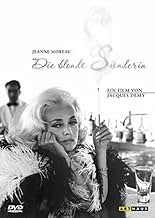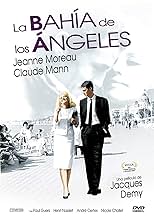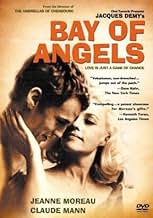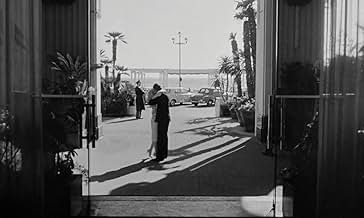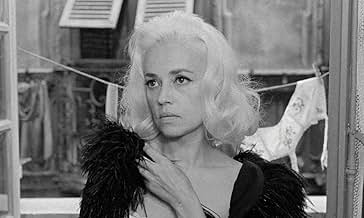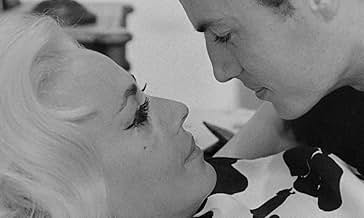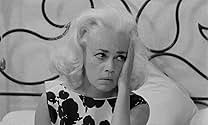CALIFICACIÓN DE IMDb
7.2/10
4.6 k
TU CALIFICACIÓN
Jean trabaja en el banco. Su compañero Caron es un jugador empedernido que le pasa un virus. Jean conoce a Jackie en el casino, y su historia corre la misma suerte que ellos jugando a la rul... Leer todoJean trabaja en el banco. Su compañero Caron es un jugador empedernido que le pasa un virus. Jean conoce a Jackie en el casino, y su historia corre la misma suerte que ellos jugando a la ruleta.Jean trabaja en el banco. Su compañero Caron es un jugador empedernido que le pasa un virus. Jean conoce a Jackie en el casino, y su historia corre la misma suerte que ellos jugando a la ruleta.
- Dirección
- Guionista
- Elenco
- Premios
- 1 premio ganado en total
- Dirección
- Guionista
- Todo el elenco y el equipo
- Producción, taquilla y más en IMDbPro
Opiniones destacadas
Jacques Demy's second feature is an amazingly fluid, vibrant comedy about love and luck, starring Jeanne Moreau at her (dazzling) best. And she is literally dazzling, in resplendent costumes (mostly by Pierre Cardin) and radiantly blonde. The music by Michel Legrand is one of his best scores ever, as it sweeps through the film, carrying everything along with two basic themes, one furiously accelerated piano theme, the other a softer, more lilting theme played in different variations, but mostly on the mandolin. It's a movie that sweeps you along, just as fast and unpredictable as a spin on the roulette wheel. This is a film in which "black-and-white" becomes a dazzling metaphor, so that the sun-drenched exteriors of the south of France are contrasted with the various interiors of hotel rooms and casinos. LA BAIE DES ANGES may seem slight, but only "seems": it's one of the most passionate statements on love and faith in the modern cinema, and it's a work of true enchantment.
Boy, take Demy away from musicals and he becomes one rather somber director, huh? In other words, I disagree with the previous reviewer, theognis 80821, who described this very bleak study of two chronic gamblers as "fun". In fact, it's so un fun that I sedulously did not buy the tacked on happy ending when Jeanne Moreau's walking ad for gamblers anonymous suddenly and inexplicably decides to renounce roulette for stolid Claude Mann (who may look like Belmondo but does not resemble his acting).
However, until that cloying last scene Demy does not hit a false note as he relentlessly chronicles the toll this insidious addiction takes on a woman of intelligence and sensitivity to the point where husband and child are tragically renounced for momentary highs at expensive and tawdry casinos. And Moreau's great performance ensures that you experience the full ugliness of it. Give it a B plus which would have been higher without that sappy ending and a different actor in the lead opposite Ms. Moreau.
However, until that cloying last scene Demy does not hit a false note as he relentlessly chronicles the toll this insidious addiction takes on a woman of intelligence and sensitivity to the point where husband and child are tragically renounced for momentary highs at expensive and tawdry casinos. And Moreau's great performance ensures that you experience the full ugliness of it. Give it a B plus which would have been higher without that sappy ending and a different actor in the lead opposite Ms. Moreau.
This is a kind of interesting film. It has been overshadowed by later, greater works by Jacques Demy, such as Les Parapluies de Cherbourg, but at its heart it has pretty much the same themes - the difficulties of translating American modernity into French provincial life. Moreau has an unusual turn as an Americanised film star, complete with bleached blonde hair -do a la Marilyn Monroe, playing Jackie, a gambler on the Cote d'Azur. Jean, on holiday from his strict father, falls in love with her. This slight plot (that really is it!)is the background for meditations on chance, love, luck, and life. There are some virtuoso cinematic moments, such as Jackie running toward Jean being glimpsed in mirrors at the end of the film. The overpowering score is slightly grating, but all in all it's a charming period piece.
This film enters with a spectacular high speed tracking shot matched by the hyper circular theme song by Michelle Legrand that sounds both like spinning and falling, and which does indeed represent both the spinning of the roulette wheel and falling in love.
Here we have the side of Jeanne Moreau I don't care for, posey, game playing and artificial... the kind of woman men like and women hate... and that made her perfect in this role. (And her performance her is Infinitely BETTER than in EVA, same type role.) What I like a lot about her casting here is that she looks quite a bit like Marilyn Monroe, but is as different internally as anyone can possibly be - which a lot of the world was doing at this time, being bad Marilyn Monroe wannabees. I love that the platinum hair makes her look much more harsh, older, and very false, and that is, of course, the essence of the character. And this film is mainly a character study, with little story and little explanation.
Our leading man is the young naive everyman sucked into her world in all respects. We feel for his every bad decision, and this is a true and real representation of both the allure and the tawdriness of the gambling world.
Without giving anything away, the ending feels contrived, but in this time period, films wanted "endings"... today a truer ending would just go on spinning like the roulette wheel. Michel Legrand's score is great. Like many of Demy's films, this is a dark story of the current day told with musicality and attention to the games we play with ourselves.
Here we have the side of Jeanne Moreau I don't care for, posey, game playing and artificial... the kind of woman men like and women hate... and that made her perfect in this role. (And her performance her is Infinitely BETTER than in EVA, same type role.) What I like a lot about her casting here is that she looks quite a bit like Marilyn Monroe, but is as different internally as anyone can possibly be - which a lot of the world was doing at this time, being bad Marilyn Monroe wannabees. I love that the platinum hair makes her look much more harsh, older, and very false, and that is, of course, the essence of the character. And this film is mainly a character study, with little story and little explanation.
Our leading man is the young naive everyman sucked into her world in all respects. We feel for his every bad decision, and this is a true and real representation of both the allure and the tawdriness of the gambling world.
Without giving anything away, the ending feels contrived, but in this time period, films wanted "endings"... today a truer ending would just go on spinning like the roulette wheel. Michel Legrand's score is great. Like many of Demy's films, this is a dark story of the current day told with musicality and attention to the games we play with ourselves.
Jacques Demy's "Bay Of Angels" may be the best movie ever made about compulsive gambling, along with the appropriately titled "The Gambler" (1974). It's not "realistic" in its technicalities (winning three consecutive times by betting on a single roulette number happens ONLY in the movies), but I don't think it wants to be; what it's trying to get at is the psychology of gambling, and at that it succeeds (in fact, it shows two different "types" of players: the wetting-his-feet and the full addict). This movie, which offers a rare view of the high and low life in and around the Nice and Monte Carlo casinos circa 1963, has the immediacy and spontaneity that the French New Wave often strived for, minus any of the pretentiousness (just compare it with Godard's not dissimilar "Pierrot Le Fou"). Jeanne Moreau sports an iconic look and plays a daringly flawed female character; the much lesser-known internationally Claude Mann is also very good. It's a minor classic. ***1/2 out of 4.
¿Sabías que…?
- TriviaAccording to Agnès Varda, Jacques Demy had little to no experience gambling prior to making this film. Although another source states Demy decided to make the movie after winning a large bet placed on the number 17. Jackie's lucky number is also 17.
- Citas
[English subtitled version]
Jean Fournier: I've been the studious, mild-mannered boy up until now. That's over now. I need something else.
- ConexionesFeatured in Jacquot de Nantes (1991)
Selecciones populares
Inicia sesión para calificar y agrega a la lista de videos para obtener recomendaciones personalizadas
- How long is Bay of Angels?Con tecnología de Alexa
Detalles
- Fecha de lanzamiento
- Países de origen
- Sitio oficial
- Idioma
- También se conoce como
- Bay of Angels
- Locaciones de filmación
- Productora
- Ver más créditos de la compañía en IMDbPro
Taquilla
- Total en EE. UU. y Canadá
- USD 85,840
- Total a nivel mundial
- USD 85,840
- Tiempo de ejecución
- 1h 30min(90 min)
- Color
- Mezcla de sonido
Contribuir a esta página
Sugiere una edición o agrega el contenido que falta

